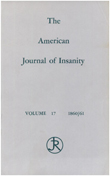Early versus late partial sleep deprivation in patients with premenstrual dysphoric disorder and normal comparison subjects
Abstract
OBJECTIVE: The aim of this study was to compare the clinical effects of early-night and late-night partial sleep deprivation in patients with premenstrual dysphoric disorder and normal comparison subjects. METHOD: In the premenstrual phase of two menstrual cycles, 23 subjects with DSM- IV premenstrual dysphoric disorder and 18 normal comparison subjects underwent a randomized crossover trial of 1) early-night sleep deprivation, in which subjects slept from 3:00 a.m. to 7:00 a.m., followed by a night of recovery sleep (11:00 p.m. to 7:00 a.m.), and 2) late-night sleep deprivation, in which subjects slept from 9:00 p.m. to 1:00 a.m., followed by a night of recovery sleep. RESULTS: For the subjects with premenstrual dysphoric disorder, in both partial sleep deprivation conditions the Hamilton and Beck depression ratings were significantly lower after recovery sleep than at baseline. Ratings on the day after early or late partial sleep deprivation tended to be lower than at baseline but were not statistically different. The normal comparison subjects showed no clinically important mood changes. A factor analytic approach used with the Hamilton depression scores showed that depressive retardation symptoms were the most responsive to sleep deprivation in the premenstrual dysphoric disorder subjects. CONCLUSIONS: These results are consistent with the reported efficacy of sleep deprivation for major depressive disorder. However, the premenstrual dysphoric disorder subjects improved after the recovery sleep rather than directly after partial sleep deprivation. That late- night sleep deprivation did not have greater benefit than did the hypothesized sham treatment, early-night sleep deprivation, also suggests that placebo effects cannot be ruled out.
Access content
To read the fulltext, please use one of the options below to sign in or purchase access.- Personal login
- Institutional Login
- Sign in via OpenAthens
- Register for access
-
Please login/register if you wish to pair your device and check access availability.
Not a subscriber?
PsychiatryOnline subscription options offer access to the DSM-5 library, books, journals, CME, and patient resources. This all-in-one virtual library provides psychiatrists and mental health professionals with key resources for diagnosis, treatment, research, and professional development.
Need more help? PsychiatryOnline Customer Service may be reached by emailing [email protected] or by calling 800-368-5777 (in the U.S.) or 703-907-7322 (outside the U.S.).



